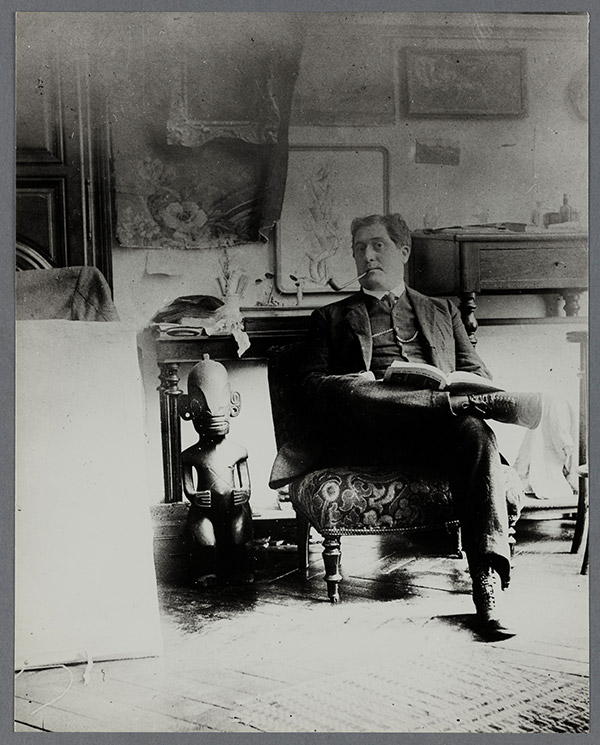The attraction for the arts of other civilizations, a challenge to ambient puritanism.
"Picasso cheerfully caricatured his friend as a duelist, a sailor, an academic, and a pope. He depicted the two of them raising their glasses to each other. They were both captivated by the African continent, with its heads and masks that defied the prevailing puritanism. Apollinaire referred to Picasso as "the bird of Benin".[1] This nickname raises a question: did it arise from a vague sense that associated the painter with a predator of sorts? Or was the poet drawing on his imagination related to Benin, given the distribution and sale of pieces during that period? Or is there a fantasized meaning to the history, role and rituals associated with the pieces?
In fact, both attributed a central role to the arts of non-European civilizations, particularly from Africa and Oceania. Their ideas on the subject could be likened to an anti-colonial approach, and they shared these views with other members of their group, namely Max Jacob, André Salmon, Félix Fénéon and Alfred Jarry, all aware of the abuses of colonial power. At the time, to claim that "civilized" Europe had much to learn from the "primitives" was to go against the grain of prevailing ideas about the role and "civilizing" mission of the old continent. [2] Picasso was interested in Africa, but with an unusual approach, wishing to blend the beautiful and the ugly, break with the notion of good taste, show something different, and question what a work of art was, where it came from, and what it meant. Both he and Apollinaire appreciated the artistic, authentic, and sincere aspects of works from other lands. The poet transcribed the painter's thoughts: "I experienced my most powerful artistic emotions when I was suddenly struck by the sublime beauty of sculptures made by the anonymous artists of Africa. These works of religious art, passionate and rigorously logical, are the most beautiful that the human soul has ever produced."[3] Both artists showed deep and genuine respect for these "anonymous" artists and their works. They were interested in their forms, but also, and above all, in what they embodied in terms of politics and poetry, in their sense of the sacred and the mysterious. Proof of this were the pieces Apollinaire kept in his apartment on Boulevard Saint-Germain, immortalized by René-Jacques.
[1] Philippe Sollers, ibid.
[2] On this subject, see Maureen Murphy, "Apollinaire et l’oiseau du Bénin (Picasso) : le primitivisme en question.", exhibition catalogue, ibid, pp. 83-96.
[3] Ibid. The quote is from Guillaume Apollinaire, Propos de Pablo Picasso. Paris, bibliothèque littéraire Jacques-Doucet, Archives Apollinaire, Ms 7540.






 Summary
Summary